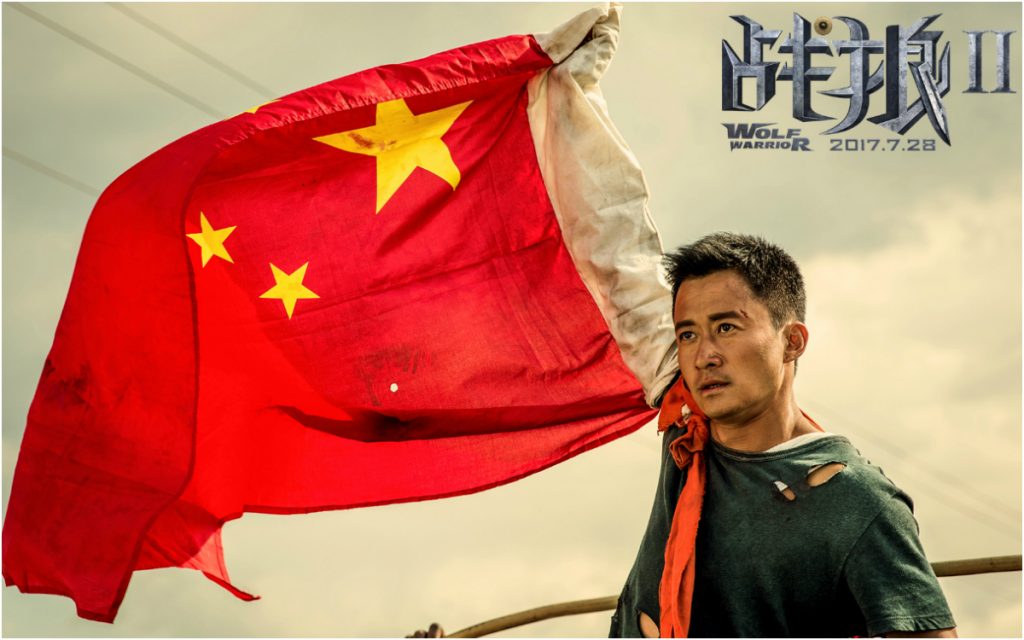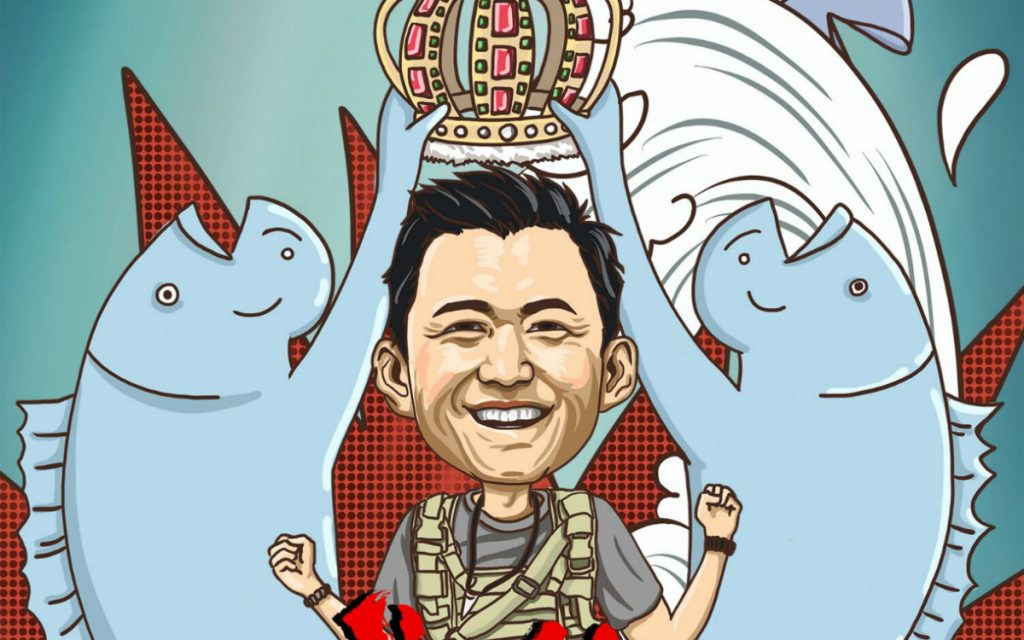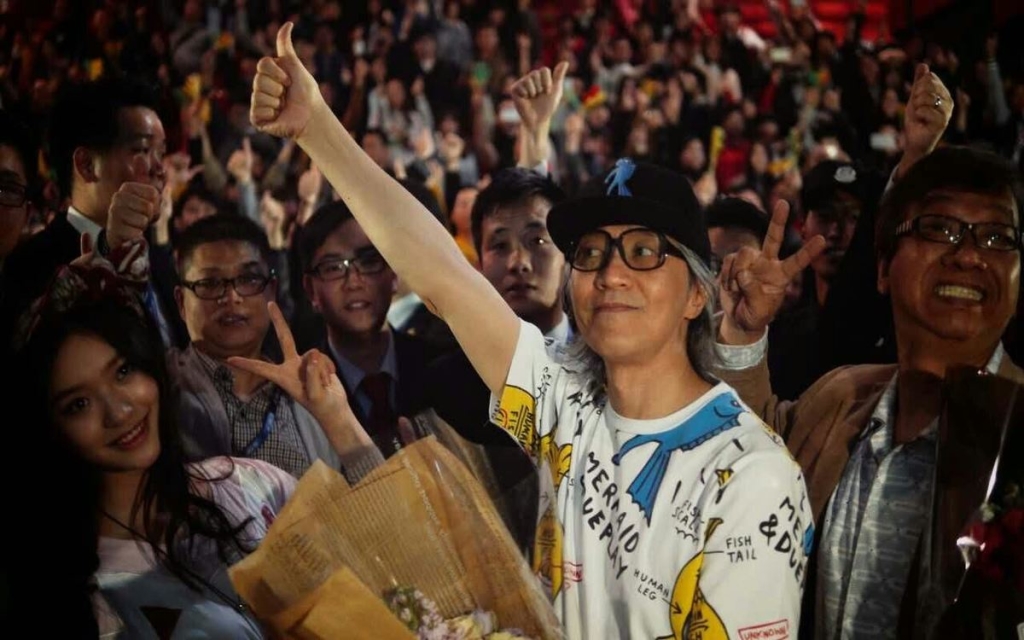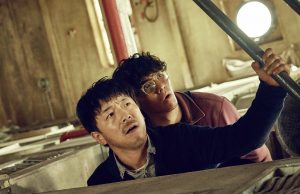Every day while CFI’s Hollywood readers take in the business of the Chinese film industry, the actual movies can sometimes seem exotic or remote. But in major US cities, mainstream Chinese films are increasingly available: thanks to Wanda’s purchase of AMC and distributors like China Lion, they get American theatrical releases practically simultaneous to their premieres at home. Though they receive virtually no publicity outside the non-Chinese community, these films are more than worth seeking out by anyone serious about engaging the Chinese industry, understanding the Chinese sensibility and familiarizing themselves with China’s talent pool. Periodically, CFI will review and point readers in the direction of noteworthy US releases of contemporary commercial and independent Chinese titles.

Photo: Wolf Warriors 2
Grade: B-
The hottest movie in China this summer tells the story of a fallen elite Chinese commando set on avenging the capture of his lover. Half way around the world in a resource-rich, disease-riddled, and war-torn nation somewhere along Africa’s coast, Leng Feng, is the gunslinging superhuman hero in writer, director and star Wu Jing’s super-violent shoot-em-up action film “Wolf Warriors 2.”
Wu has delivered China’s best-yet imitation of the flag-waving, chest-thumping nationalist action movie that Hollywood has churned out for decades, spinning a tale of military supremacy, do-or-die bravado and exceptional moral rectitude. The movie arrives just as China has set up its first overseas base, in Djibouti, in East Africa, a “support base” that the Chinese have installed to maintain China’s growing overseas interests, according to its foreign minister Wang Yi, and to help protect Chinese commercial shipping between the Red Sea and the Indian Ocean.
Leng Feng, while pining for his lost lover (also a military hero of the People’s Liberation Army), volunteers to rescue a Chinese doctor on the cusp of curing the fictional African nation’s deadly outbreak of Lamanla, a disease ripping through the labor force that produces ugly open sores, stupor and death. Leng steps up to save the doctor when the PLA Navy officer called in to rescue Chinese businessmen from the chaos of a revolution declines to make an incursion into the country’s interior because he doesn’t have United Nations approval.
Leng, in a very American-movie-hero sort of way, takes it upon himself to tackle both local insurgents and the foreign mercenaries who are plundering natural resources and fighting for possession of the doctor with the cure to the disease that plagues the labor force.
Call American military forays overseas adventurism if you will, but to claim—even in a piece of fictional entertainment—that China has the know-how and experience, let alone the political will, to pull off a rescue operation on the scale portrayed in ”Wolf Warriors 2” is a flight of fancy. The movie’s blatant positioning of Chinese morals and military might as being head and shoulders above those of the United States, the United Nations, and Doctors Without Borders makes this movie an accidental specimen of the fantasy film genre.
No matter; fantasy sells in China. “Wolf Warriors 2,” which ended a brief run on Wednesday in New York, where it played to a crowd that looked like it was made up almost entirely of Chinese exchange students and young professionals, racked up $594 million in China in its first two weeks there, and overtook “The Mermaid” last week to become the nation’s highest-grossing film of all time.
So, since selling tickets is what the movie business is about, Hollywood be warned: big budget American spy-thriller, commando rescue films that bleed red, white and blue—and lately have recouped a great portion of their budgets by screening in China—your days are numbered.
Numbered in China, at least. And there’s the rub. While Hollywood blockbusters, from “Top Gun” in the Cold War era through to the “Mission Impossible” and “Transformers” films of recent years, continue to succeed around the globe in part, no doubt, because local film audiences have been exposed to American military might, for better or worse—but often for better—Chinese military-themed blockbusters have next to nothing from the realm of reality to back them up. China’s spending on overseas aid, backed by peacekeeping troops, is a fraction of America’s.
But this Chinese film was made not as external propaganda to convince the world, and Africans in particular, of Chinese do-goodism. Rather, it seems likely that it was made instead to gin up support among China’s citizens for the idea that the country’s expanding presence in resource-rich Africa will further expose Chinese workers sent overseas to the dangers of the outside world, and that those workers need not fear because the Chinese military—largely non-interventionist since the Sino-Vietnam war of 1979—will protect them at all costs.
A title card at the end of the film, which appears over an image of a Chinese passport, seemingly confirms this motive: “Citizens of the People’s Republic of China: Don’t worry if you run into any danger while abroad! Please remember, the strength of China always has your back!”
China may have the backs of the Chinese overseas, but how those citizens represent their nation abroad is a different matter. The film’s stereotypes of Africans betray a tendency by many Chinese to speak about non-Chinese in rather blunt, simple and often racist terms.
The black Africans take the brunt of this behavior in the film’s script and in its casting. There’s the pudgy African kid who’s either crying like a baby or stuffing his face; there’s his Rubenesque mother whose body weight becomes a repeated sight gag when she smothers bad guys with her flesh; there’s the docile—and suddenly feral—little African girl; not to mention the bloodthirsty but expendable African rebels. (The sheer number of black bodies that get blown away by automatic machine-gun fire in “Wolf Warriors 2” is astounding).
There’s also the throw-away comment, from one former People’s Liberation Army officer-turned-mercenary to another after victory in a vicious firefight that saved African workers at a Chinese factory: “Whether it’s war, poverty, or disease, our African friends always know how to cut loose around a bonfire.”
Africa, meet China. Or meet the kind of portrayal of you and your traditional tribal peoples that Hollywood and now China, too, tend to spread to others for entertainment and a quick buck. And good luck, China, trying to sell this sort of shallow propaganda in your newest markets in Africa, let alone in America.
As long a history as Hollywood has had of racial stereotyping, lately, it has learned a thing or two and begun to make films that still portray American might and right but also include more progressive views of peoples of all colors, regardless of their loyalty to any one flag.
“Wolf Warriors 2” gets a B-minus grade—and not a C+—for sneaking in a few concessions that surprise: There’s an acknowledgement of Chinese workers marrying African women (though none is given a voice), and there’s the modest use of decent special effects that help the film almost achieve the look and feel of a Hollywood blockbuster. It’s only when the Chinese navy fires missiles from offshore to take out the bad mercenaries and rebels that the illusion is again pierced and we’re reminded why this could never be an A-film outside China: “Wolf Warriors 2” just doesn’t ring true.
WHAT DOES THE GRADE MEAN?
Here are some recent & modern-era vintage Chinese and Hong Kong films for comparison
- A+
- PLATFORM (2000, dir Jia Zhangke)
- THE WORLD (2004, dir. Jia Zhangke)
- DRUNKEN MASTER 2 (1994, dir. Lau Kar Leung & Jackie Chan)
- KUNG FU HUSTLE (2004, dir. Stephen Chow)
- A
- LET THE BULLETS FLY (2010, dir Jiang Wen)
- THE MERMAID (2016, dir. Stephen Chow)
- A TOUCH OF SIN (2013, dir. Jia Zhangke)
- STILL LIFE (2006, dir. Jia Zhangke)
- MOUNTAINS MAY DEPART (2015, dir. Jia Zhangke)
- LITTLE BIG SOLDIER (2010, dir. Ding Sheng)
- EXTRAORDINARY MISSION (2017, dir. Alan Mak & Anthony Pun)
- MR SIX (2015, dir. Guan Hu)
- A WORLD WITHOUT THIEVES (2004, dir. Feng Xiaogang)
- SUZHOU RIVER (1999, dir. Lou Ye)
- HOUSE OF FLYING DAGGERS (2004, dir Zhang Yimou)
- RAISE THE RED LANTERN (1991, dir. Zhang Yimou)
- A-
- DUCKWEED (2017, dir. Han Han)
- I BELONGED TO YOU (2016, dir. Zhang Yibai)
- B+
- THE GREAT WALL (2016, dir. Zhang Yimou)
- OLD STONE (2016, dir. Johnny Ma)
- CRAZY STONE (2006, dir. Ning Hao)
- GO, LALA GO (2010, dir. Xu Jinglei)
- B
- KUNG FU YOGA (2017, dir. Stanley Tong)
- RAILROAD TIGERS (2016, dir. Ding Sheng)
- THE WASTED TIMES (2016, dir. Cheng Er)
- CHONGQING HOT POT (2016, dir. Yang Qing)
- MONSTER HUNT (2015, dir. Raman Hui)
- B-
- JOURNEY TO THE WEST: THE DEMONS STRIKE BACK (2017, dir. Tsui Hark)
- SOME LIKE IT HOT (2017, dir. Song Xiaofei & Dong Xu)
- BORN IN CHINA (2016, dir. Lu Chuan)
- D-
- TINY TIMES (2013, dir. Guo Jingming)








